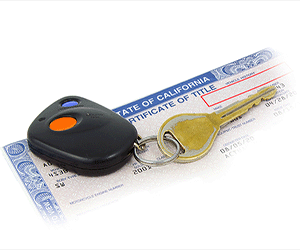California Vehicle Title Lookup
Accessing vehicle title information is not always a simple process. In California, the Department of Motor Vehicles (DMV) is usually the go to resource for all things vehicle records. While you can access some vehicle records online, the DMV website website is often vast and time consuming and requests can often take several days to fulfill, or longer. So what are the other options? There are many third party resources available that offer instant results for verifying California vehicle title information. All you need is the license plate number or vehicle identification number to access vehicle title records. However, there are some exceptions to what you can access through third party website. We will go over what publicly available information you can find with a CA vehicle title search, how to replace a lost or damaged title, and what are the restrictions to accessing this information. Whether you're a vehicle owner, a potential buyer, or a seller, this guide can help streamline your efforts.
How to Run a California Vehicle Title Search
The first step in running a CA vehicle title search is to have either the 18-digit vehicle identification number, or the license plate number. Then using a reliable vehicle records website, you can access the majority of the information listed on someone's CA vehicle title. Some personal information may be sealed for privacy reasons, such as the address of the vehicle owner but the majority of the information can be accessed for verification purposes. You can find out if there are any lien holders, if the vehicle has been salvaged, or if the odometer reading is accurate.
What Information Does a CA Vehicle Title Include?
A CA vehicle title is a legally binding government document that verifies vehicle ownership, as well as listing key vehicle information. In California, the Department of Motor Vehicles (DMV) issues and manages these titles. These are only issued to the owner of a vehicle, which can be an individual, business, or a bank, which is also a lien holder. Title information also provides transparency and helps verify vehicle legitimacy for when vehicles are bought and sold.
Key information on a vehicle title typically includes:
1). Owner's name and address
2). Vehicle Identification Number (VIN)
3). License plate number
4). Vehicle make, model, and year
5). Date of issuance
6). Odometer verification, listing if the reading is accurate
7). Any lienholder details, if applicable
8). Title brands (i.e. damaged, salvaged, totaled, junk, etc..)
9). Transfer of title, on the back side
10). Release of liability, for selling the vehicle
Having this information is very important, especially for buyers. Reviewing the physical title is an important step to make certain there are no hidden issues like liens or if the vehicle has been salvaged or junked. This is especially important during vehicle sales and transfers, providing peace of mind to all involved parties. If there is no title available it's prudent to ask for one prior to taking ownership. This is because there is no recourse when a vehicle is purchased as-is, which means any future issues will be yours to resolve and not the previous owner.
Why Perform a California Vehicle Title Lookup?
A California vehicle title lookup is a powerful tool that is performed before purchasing. It's an important step to check the title to avoid potential issues. Having this information is very important, especially for buyers. Reviewing the physical title is an key step in making certain there are no hidden issues like liens or if the vehicle has been salvaged or junked. This is especially important during vehicle sales and transfers, providing peace of mind to all involved parties. If there is no title available it's prudent to ask for one prior to taking ownership. This is because there is no recourse when a vehicle is purchased as-is, which means any future issues will be yours to resolve and not the previous owner.
How to Request a Replacement California Vehicle Title
If your vehicle title is lost or damaged, you’ll need a replacement, especially if you want to sell your vehicle. To replace your title you'll need to do this directly from the DMV, either online or in-person. Proper identification and proof of ownership are required. The main form you'll need is the Application for Duplicate Title (Form REG 227). This form is the key to starting your request. Complete it carefully, double checking that all your information is accurate. Notarization may be necessary for some details, if you are releasing the title or changing lienholder information.
Once everything is in order, submit your application either by mail or at a DMV office. Include any applicable fees, which can be paid by check or money order. If submitting by mail, the DMV will typically mail it to the address listed on the original title. If this is different, you may want to visit an office to make sure your application is not rejected. For those seeking faster processing, expedited services are available, but there will be an additional fee. This is a consideration if time is of the essence.
Steps to Request a Duplicate CA Vehicle Title:
1). Have your driver's license ready and proof of ownership.
2). Complete the Application for Duplicate Title (Form REG 227).
3). Notarize the form if required, typically only necessary for mailing in applications.
4). Submit the application and fee by mail or in person.
5). Expedited processing is available for faster fulfillments.
How to Transfer a California Vehicle Title
Transferring a CA vehicle title is a necessary step in the sale or ownership change. Both the buyer and seller have a role to play in this process. It starts by reviewing the title itself and the seller signing over the title and filling out the release part to the buyer. This must include the date, the sales amount and the signature of the seller. The seller should also sign the release of liability and send that in so that they are released from any issues or accidents that may happen after the transaction and before the buyer takes the title to the DMV. It's also a good idea to list the vehicle "As-Is". This means that the seller is not responsible for any mechanical or physical issues after the sale.
The next part is for the buyer of the vehicle. The buyer needs to fill out their relevant section on the title. They must also provide their name, address, and signature. Then the title can be taken to the DMV to have it transferred. This includes paying any necessary transfer fees. Don’t forget, a smog certification will also be required needed unless the vehicle is exempt. Safety inspections are not required in California, like other states. If the vehicle has a lien, meaning a bank is listed as the owner, this needs to be resolved before transferring it to the new owner. Otherwise, the transfer cannot be processed. This is why it's important to review all the information on the title before handing over any cash. It might also be savvy to obtain a bill of sale from the owner to have additional proof that the transaction is legitimate.
How to Avoid Issues When Transferring a CA Vehicle Title
Performing a vehicle title check might be the most important step before purchasing a car. It confirms the vehicle's status, including verifying the odometer is accurate, and there are no title brands, such as junk or salvaged. Many buyers overlook this, risking significant problems down the line. If there is no title available, that is a red-flag. It means you are taking the sellers word on everything, including that they actually own the vehicle.
One common pitfall is ignoring potential liens on the vehicle. A lien means a financial interest tied to the car, which could lead to complications. Always verify that there are no outstanding liens before finalizing any purchase.
Another frequent mistake is failing to check for salvage titles. A salvage title indicates extensive damage from a past accident or event. Knowing this can save buyers from acquiring a car that might be unsafe or costly to repair. Using trusted resources to examine the vehicle's title, and running a vehicle history report, is a must for informed purchasing decisions. There is very little recourse after the transaction is finished, so remember to verify before you buy.
When Should I Request a Replacement CA Vehicle Title
A replacement title is always a good idea if the original is compromised. This includes scenarios such as loss, theft, or damage. Owners should request a replacement promptly to avoid legal complications. It can be very complicated to sell any car, truck, or SUV without one. Another reason for replacement is when a title becomes illegible. This could occur due to fading or deterioration over time. The DMV will not accept a compromised title when transferring it to a new owner if it is not legible.


